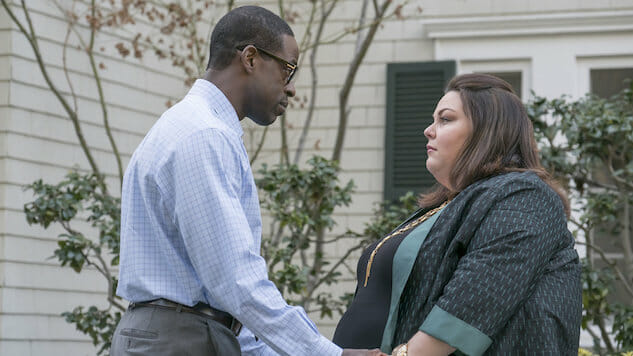This Is Us: “What Now?”
(Episode 2.17)
Ron Batzdorff/NBC
Following William’s passing in “Memphis,” I admit I dreaded tuning into this week’s episode of This Is Us. I’ve gotten used to the weekly flow of tears brought on by these beautiful characters and the situations they’re navigating, but I had prepared myself for an episode of the depressing variety. I imagined Randall slumped over on his late father’s bed, unable to breathe through his tears; I pictured Kate falling to pieces at the graveyard, remembering her own father’s untimely death; and I thought of Randall’s usually cheerful daughters, Tess (Eris Baker) and Annie (Faithe Herman), weeping into their pillows, desperately missing their grandfather. But “What Now?” handles William’s death with such grace and soul that the love and incredible honesty of it all ultimately trumps the intense feeling of sadness at having lost one of the series’ most inspiring characters.
Growing up, my parents gave me the freedom to decide whether I wanted to become a Christian, a Buddhist or just… me. I wasn’t forced to take religious studies at school like 97% of my classmates, and I wasn’t expected to go to church for special occasions, even when other family members did. But at a certain age, I started developing an interest in what my cousins and classmates were up to at their evangelical children’s group, so I rocked up a couple of times, ready to absorb some nice stories and help out in the community garden. It was all right, but I didn’t feel any personal connection to the stories or the people in them, like the others seemed to. This became even more evident when I attended my first funeral at age eleven. I listened to the priest’s sermon and all I could think was, “Who is this guy talking about?” There was nothing personal said about the deceased; no part of his monologue celebrated the person she was or the life she lived. I was baffled by the coldness and tragedy of it all. Where was this connection the people beside me spoke of with such pride?
William did not want his family—particularly his granddaughters—to suffer through the traditional, impersonal setting of a wake. He didn’t want them to have to listen to a stranger fill in the blanks of a pre-existing script with his name; he wanted his passing to bring the family together through shared memories and personal tributes. That’s why he left his final business to Tess and Annie, whom he trusted to make this day one filled with smiles—even through a veil of tears. The fancy catering team and white doves (because “there are no black doves”) Beth has organized are discarded in favor of rainbow-colored balloons, confetti and a breakfast spread (grandpa’s favorite!) fit for kings. Most apt of all, the girls organize a range of colorful old-man hats for everyone to wear on the morning walk William cherished so much. As strange as it may seem to those who rigidly adhere to institutionalized customs, all these little details truly and dearly honor William and the man he was—“a soft armrest for weary souls to lean on.”
-

-

-

-

-

-

-

-

-

-

-

-

-

-

-

-

-

-

-

-

-

-

-

-

-

-

-

-

-

-

-

-

-

-

-

-

-

-

-

-








































